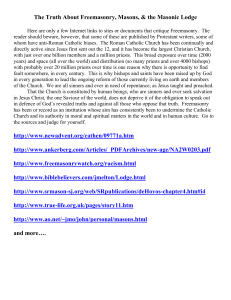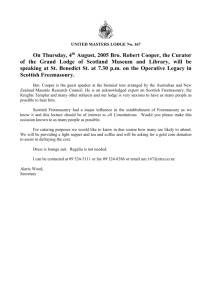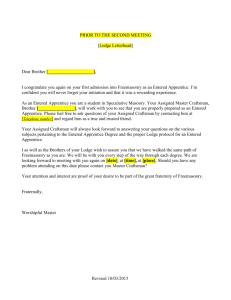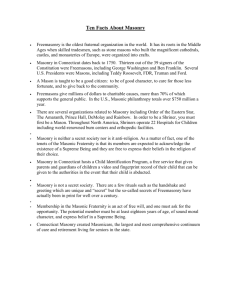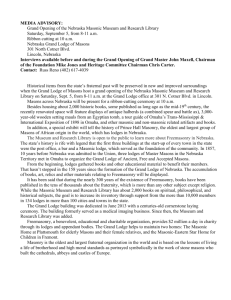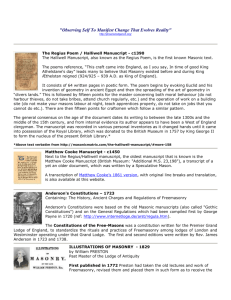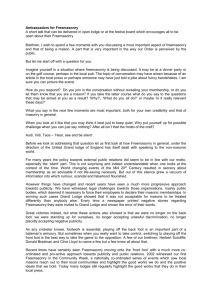MS Word
advertisement
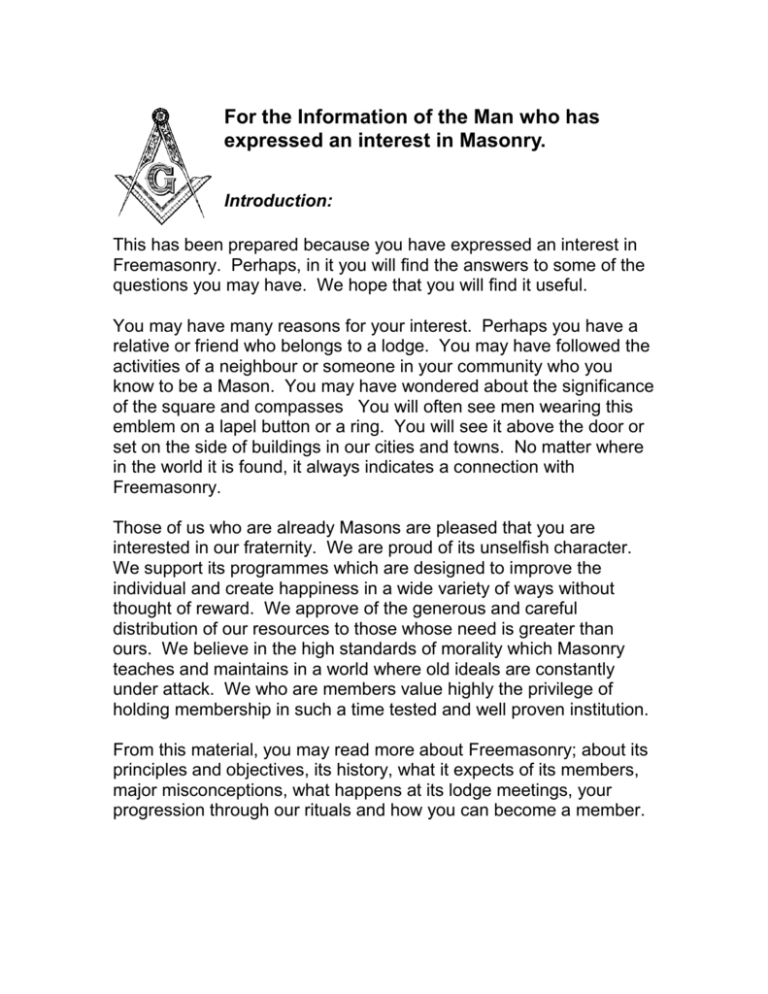
For the Information of the Man who has expressed an interest in Masonry. Introduction: This has been prepared because you have expressed an interest in Freemasonry. Perhaps, in it you will find the answers to some of the questions you may have. We hope that you will find it useful. You may have many reasons for your interest. Perhaps you have a relative or friend who belongs to a lodge. You may have followed the activities of a neighbour or someone in your community who you know to be a Mason. You may have wondered about the significance of the square and compasses You will often see men wearing this emblem on a lapel button or a ring. You will see it above the door or set on the side of buildings in our cities and towns. No matter where in the world it is found, it always indicates a connection with Freemasonry. Those of us who are already Masons are pleased that you are interested in our fraternity. We are proud of its unselfish character. We support its programmes which are designed to improve the individual and create happiness in a wide variety of ways without thought of reward. We approve of the generous and careful distribution of our resources to those whose need is greater than ours. We believe in the high standards of morality which Masonry teaches and maintains in a world where old ideals are constantly under attack. We who are members value highly the privilege of holding membership in such a time tested and well proven institution. From this material, you may read more about Freemasonry; about its principles and objectives, its history, what it expects of its members, major misconceptions, what happens at its lodge meetings, your progression through our rituals and how you can become a member. What is Freemasonry and what are its objectives? Freemasonry is a non religious organization which throughout its very many years of existence has maintained a consistent set of principles which are in parallel and which compliment those of major religions of the world while at the same time promoting the simple but important objectives of helping men and women everywhere to live happy lives. These principles include; kindness and consideration at home, honesty in business, courtesy towards others, dependability in one's work; compassion for the unfortunate; and being a good citizen of the whole world. Freemasonry helps its members through its lessons and friendships and society as a whole through both its members' activities and its charitable works. While Freemasonry's activities and works may vary from town to town and from country to country, its principles and objectives remain the same wherever it exists in the world. The organization of Freemasonry is based on a system of Grand Lodges, each sovereign within its own territory. There is no central authority governing all Grand Lodges. To be acknowledged by others, however, acceptable traditions, standards and practices must be maintained. In our Province the governing body is called the Grand Lodge of Ancient, Free and Accepted Masons of Canada in the Province of Ontario. It is under the leadership of a Grand Master. He presides over the nearly 80,000 Masons in this jurisdiction who belong to one or more of the 648 lodges. Each of these lodges is under the direction of a Worshipful Master. What are Freemasonry's origins? Freemasonry's traditions can be traced directly to the associations of operative Masons. They were men of outstanding character and high ideals, who built the cathedrals, abbeys and castles of the Middle Ages. With the decline of Cathedral building in the 17th Century, many guilds of craftsmen called "Operative" Masons started to accept those who were not working members of the Masons' crafts into their membership and they were called "Speculative" or "Accepted" Masons. These Speculative Masons were learned and well thinking men - men of integrity and goodwill. With their admission into membership in these groups which were called lodges, Freemasonry as we know it today had it beginning. The tools once used for building have been transformed into emblems of moral and spiritual laws. In 1713, four such lodges, which had been meeting regularly in London, united to form the first Grand Lodge of England under the direction of a Grand Master. From that first Grand Lodge, Freemasonry has spread throughout the world. Today, there are some 150 Grand Lodges having a total membership of approximately five million Masons. What does Freemasonry do? As a Fraternity, Freemasonry provides an opportunity for men to meet and enjoy friendly companionship. In the spirit of helpfulness and brotherly love and guided by the strict moral principles, it encourages goodwill towards all mankind. Freemasonry promotes selfimprovement and teaches the basic principles of brotherly love, charity and truth which Masons are encouraged to practice in their daily lives. Masons serve society charitably - not just with money (although over two million Masonic dollars are contributed every day to Masonic philanthropies in North America alone) but also through actions and deeds. In the Middle Ages each lodge of Operative Masons maintained a charity chest to help widows and orphans, or members in distress. In addition, they assisted a fellow Mason by giving him a day's work or the means of traveling to the project of a neighbouring lodge. In same manner, Masonic Lodges of today provide funds to quietly assist members in need, send remembrances to widows or special greetings to brethren confined by age or illness. Freemasonry participates in community fund raising projects such as disaster relief, specialized hospital equipment, vehicles for the handicapped or additions to hospitals. The Masonic Foundation of Ontario provides non repayable bursaries to Ontario university and college students who need help. In the first 30 years of this programme assistance was given to 1,882 students. During the 1993-1994 year, 195 students received bursaries totaling more than $150,000. The Foundation has a strong interest in youth related projects. It presently supports 'Voice', a Provincial organization that assists hearing impaired children. Financial help goes to Autistic Homes of Ontario, and expanding organization providing homes in which small groups of adolescents with this severe learning disorder receive instruction and guidance. The Foundation is a major partner in the deafness and implant programme of the Ontario Deafness Research Foundation. During the past few years well in excess of one million dollars has been raised, which has allowed for sizable financial support of two organizations, "Parents Against Drugs" and "Council on Drug Abuse". These organizations currently train teams of students in their upper years of high school on the dangers of drug abuse, and then have them present educational programmes to the younger students. Some Possible Misconceptions: Freemasonry is not a religion. Even so, no atheist may become a member. Before being admitted, every candidate is required to affirm that he believes in a Supreme Being, that he is convinced that a virtuous life is rewarded and the wrongdoing is punished, and that he recognizes that Divine Truth has been revealed to man. Masonry is NOT a secret society. Masonry is NOT a benevolent society or a service club. Masonry is NOT a social club, even though it encourages fraternal fellowship among its members. Topics such as politics or religion which might provoke controversy or dissension are not introduced at its meetings. Masonry seeks for happiness among its members, and it encourages the communication of happiness to others. Masonry has no policy of evangelism or reformation. It does not strive to convert or rehabilitate wicked or immoral men; in fact, it tries to to exclude them from its ranks. It does seek to make good men better. It encourages charity in act, word and thought. Masonry is not an avenue of social advancement. There is no place in the Fraternity for a man who cannot meet his associates, and deal with them as equals. He must always remember that all men, no matter what their station in life, or their race, or their colour, are partakers of the same nature, and that in the long run the only distinction which counts for anything is individual human worth. Your progression through our Rituals: Applicants to Freemasonry are guided through basic ceremonies or rituals during which they are awarded what we call "Degrees". The three Degrees are called; "Entered Apprentice", "Fellowcraft", and "Master Mason". When an applicant's petition is accepted by a lodge, he is advised of the date when the Entered Apprentice Degree will be conferred upon him. On that date the applicant is dressed in a special garment and taken into the lodge where a team of members present what is effectively a play called the "Entered Apprentice Degree". This is a solemn and dignified ceremony which has been passed down almost unaltered throughout the years and for which our participating members memorize their parts. You will be asked to give a solemn and binding promise never to disclose certain details of this ceremony to anyone except another Mason. You will not be asked to promise anything contrary to your religious, civil or other duties. You should approach the ceremony calmly and solemnly, with mind and spirit attentive to the lessons which will be imparted. After receiving the Entered Apprentice Degree, you will be expected to memorize - but with the help from one or more of your lodge brethren - several key passages of the ritual. Having learned the required ritualistic work and after satisfying the lodge of your proficiency in that work, the Fellowcraft Degree will be conferred upon you. You will again be asked to memorize and show your proficiency in some further ritual work after which the last and highest degree in Ancient Craft Masonry namely that called "The Master Mason Degree" will be conferred upon you. How do you become a member? One of Freemasonry's customs is to not solicit for members. However, anyone should feel free to approach any Mason to seek further information about the fraternity. Membership is for men 21 years of age or older who are of good moral character, and who believe in the existence of a Supreme Being. A man who wants to join a lodge must be sponsored or recommended by two members of that lodge who will sign the application form. Then, some other members of that lodge may wish to meet the applicant and his wife and family to find out more about him (to answer any questions he or his family may have about Freemasonry) and to advise him about the initiation fee and the annual dues, what will be expected of him if his application is accepted and what will occur at his initiation into Freemasonry. What Freemasonry expects of its members: Freemasonry welcomes applications from men who seek harmony with their fellow man and who wish to participate in making this world a better place in which to live by promoting Masonic ideals of reverence, morality, kindness, honesty, dependability and compassion. Its members are expected to: Be loyal to their families, their employers, their communities and to the fraternity. Honour their country, uphold its laws and respect those in authority. Participate in lodge activities including particularly its charitable endeavours. Promote the fraternity's principles and objectives. Conclusion: Man is constantly re-examining his goals and his values as he seeks to relate them to his changing world. In Masonry you will find men of good will and high ideals, men who believe in God and who try to live in a spirit of universal brotherhood. The principles in which they believe are proven and tested. A Masonic Lodge is one place in which all can work together with a rare unanimity, looking towards a brighter tomorrow. In short, Masonry is striving to build a better world by building better men to live in it.
